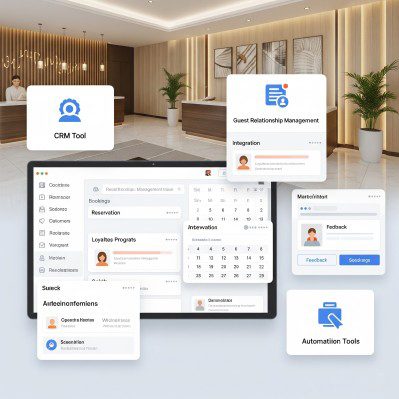Emotional Intelligence in Hotels – A Complete Training & Implementation Guide for Hotel Professionals

🏨 Introduction: Why Emotional Intelligence (EI) Matters in Hospitality
In the hotel industry, emotional labor is constant—smiling through stress, managing expectations, de-escalating complaints, and connecting with guests from diverse cultures. For hotel professionals, Emotional Intelligence (EI) is not just a personality trait—it’s a core professional skill.
📌 Definition of Emotional Intelligence:
Emotional Intelligence is the ability to understand, manage, and influence emotions—your own and others’—in ways that foster positive interactions, reduce conflict, and enhance teamwork and service quality.
🎯 Benefits of EI for Hotel Staff
| Area | EI Impact |
|---|---|
| Guest Experience | Guests feel genuinely heard, valued, and cared for |
| Conflict Resolution | Reduced incidents, faster de-escalation |
| Team Collaboration | Stronger morale, communication, and unity |
| Leadership Development | Managers inspire rather than control |
| Staff Retention | Emotionally safe workplace = less burnout |
🧩 5 Core Components of Emotional Intelligence (Daniel Goleman Model)
- Self-Awareness – Understanding your emotions, strengths, and triggers
- Self-Regulation – Managing emotional reactions and staying calm under stress
- Motivation – Inner drive to deliver service excellence
- Empathy – Recognizing and responding to others’ feelings
- Social Skills – Building rapport, handling conflict, and communicating positively
📚 5-Module EI Training Program for Hotel Staff (With Professional Application)
Each module includes learning goals, real hotel scenarios, skills, trainer guidance, and follow-up practices.
🧠 Module 1: Self-Awareness – Foundation of Emotional Intelligence
🧭 Purpose:
Help hotel staff identify and name their emotions and how these affect guest service and behavior.
🔍 Real Hotel Scenarios:
- A front office associate realizes they’re frustrated during peak check-in
- A housekeeping staff notices anxiety before a VIP room check
- A waiter misinterprets guest silence as rudeness
💡 Skills to Train:
- Emotional vocabulary
- Mindfulness before shifts
- Daily self-reflection
🧩 Activity:
“Mood Mirror” – Each staff member writes the emotion they’re feeling at the start and end of the shift. Discuss how it influenced their service.
👨🏫 Trainer Notes:
“Self-awareness allows staff to shift from reactive to reflective. Emotional clarity improves decision-making under pressure.”
⚖️ Module 2: Self-Regulation – Emotional Control in Service Situations
🧭 Purpose:
Teach staff to control impulses and manage difficult interactions professionally.
🔍 Real Hotel Scenarios:
- Guest complains loudly about billing error
- Room service is delayed, and guest becomes rude
- Housekeeper walks into a room, and guest shouts for privacy
💡 Skills to Train:
- Pause before responding
- Breathing techniques (Box breathing: inhale 4, hold 4, exhale 4, hold 4)
- Reframing situations mentally (“The guest is upset at the situation, not me.”)
🧩 Roleplay Exercise:
Angry Guest Check-in Simulation
- Staff 1 reacts emotionally
- Staff 2 uses emotional control and empathy
- Compare outcomes
👨🏫 Trainer Notes:
“Self-regulation builds trust. Guests feel safe when staff remain calm and grounded—even under pressure.”
🔥 Module 3: Motivation – Finding Purpose in Hospitality
🧭 Purpose:
Reignite passion for service and align emotional energy with professional growth.
🔍 Real Hotel Scenarios:
- Staff goes out of their way to help a guest find a lost item
- Bellboy who greets every guest cheerfully even on long shifts
- F&B staff handles a large group with energy and professionalism
💡 Skills to Train:
- Goal-setting for service excellence
- Celebrating impact (sharing guest compliments)
- Peer recognition
🧩 Group Activity:
“Hospitality Hero” Circle
- Each person shares a recent moment when they exceeded guest expectations
- Team votes for one hero of the day/week
👨🏫 Trainer Notes:
“Motivated staff don’t wait for reminders—they anticipate service needs because they care about results.”
❤️ Module 4: Empathy – Understanding Guest and Team Emotions
🧭 Purpose:
Strengthen emotional connection with guests by understanding their needs and emotional state.
🔍 Real Hotel Scenarios:
- A solo woman traveler arrives late and nervous
- A guest is crying quietly in the lounge
- A foreign guest is frustrated by language barriers
💡 Skills to Train:
- Active listening (nod, eye contact, paraphrasing)
- Emotional validation (“I understand this is frustrating, Sir.”)
- Adjusting service based on emotional tone
🧩 Simulation Exercise:
Empathy Scenes
- Play out 2 guest scenarios where staff must show understanding (e.g., “My flight was delayed 7 hours.”)
- Peers give feedback on empathy level
👨🏫 Trainer Notes:
“Empathy is not agreeing with someone—it’s acknowledging their emotions and responding with care.”
💬 Module 5: Social Skills – Communication and Relationship Building
🧭 Purpose:
Enhance guest satisfaction and internal teamwork through effective communication.
🔍 Real Hotel Scenarios:
- Coordinating between housekeeping and front office during early check-outs
- Upselling without sounding pushy
- Resolving a guest complaint between two departments
💡 Skills to Train:
- Positive body language
- Assertive vs aggressive speech
- Conflict de-escalation
🧩 Activity:
VIP Arrival Drill
- Staff groups plan a seamless VIP check-in involving multiple departments (FO, Bell Desk, HK)
- Present plan and reflect on communication flow
👨🏫 Trainer Notes:
“Social skills create harmony. Communication isn’t just speaking—it’s listening, adjusting tone, and aligning with others.”
📋 Emotional Intelligence Self-Assessment for Hotel Staff
Instructions:
Ask each staff member to rate themselves (1–5) on statements like:
- “I stay calm during stressful guest interactions.”
- “I listen without interrupting.”
- “I’m aware when I’m feeling angry or tired.”
- “I enjoy helping others at work.”
Score Breakdown:
| 21–25 | Excellent – Strength area
| 16–20 | Good – Keep building
| 11–15 | Needs focus
| <10 | Requires coaching/training
Encourage them to reflect on 1 strength and 1 improvement area.
🎭 Roleplay Scenarios (For Practice Sessions)
| Scenario | EI Focus |
|---|---|
| Guest shouting at reception | Self-Regulation, Empathy |
| Elderly guest confused about elevator | Patience, Empathy |
| Foreign guest upset with food | Empathy, Cultural awareness |
| Internal argument at front office | Self-Awareness, Social Skills |
| Guest compliments bellboy | Motivation, Gratitude |
| Staff addresses team mistake calmly | Self-Control, Leadership |
Each scenario includes:
- Script
- Emotional challenge
- Debrief questions
- Peer feedback
🧑🏫 Professional Trainer Tips
- Use hospitality-specific stories and local language analogies
- Start sessions with emotional warm-ups (e.g., “How’s your mood today?”)
- Debrief every activity with reflection questions
- Reward emotional skills just like technical ones
🧾 Post-Training Implementation Tips
- Include EI skills in staff performance evaluations
- Assign “EI Champions” per department for peer coaching
- Create a monthly EI Reflection Corner or “Emotional Wins Board”
- Encourage supervisors to model EI behaviors daily
📥 Training Resources Available on Request
✅ Editable PPT (with trainer notes)
✅ Printable Self-Assessment Sheets
✅ Roleplay Scripts & Activity Sheets
✅ Monthly EI Review Tracker
✅ Certification Template for Trainees
🏁 Final Thought
“In hospitality, Emotional Intelligence is not extra—it’s essential. When staff feel emotionally strong, service becomes soulful. Guests may forget a towel delay—but they’ll never forget being treated with dignity, care, and calm.”









